Professor Anthony Good
Job Title
Professor Emeritus

Building (Address)
Chrystal Macmillan BuildingStreet (Address)
15a George SquareCity (Address)
EdinburghCountry (Address)
UKPost code (Address)
EH8 9LDResearch interests
Research interests
South Asia, kinship, Hinduism, anthropology of law, asylum seekers and refugees
Topics interested in supervising
In the past I have supervised students working on Hindus in Pakistan; Hindu festivals in South India and Edinburgh; divine possession in the Nilgiris; pilgrimage in Kerala; Indian kingship; South Indian classical dance; satellite television in India; Buddhist revival in Cambodia; relations between the dead and the living in contemporary Vietnam; appropriate technology in Sri Lanka; child labour; child refugees in Africa; West African migrants in Morocco; post conflict property restitution in Kosovo; culturally competent nursing for asylum applicant families; experiences of waiting among asylum applicants; and the social integration of refugees (the last three all focused on Glasgow). Although officially retired I am still willing to co-supervise research students (but only if their topic really interests me!) in areas related to: India and Sri Lanka; refugees and migration; anthropology of law; kinship; anthropology of religion; historical anthropology.
If you are interested in being supervised by Anthony Good, please see the links below (opening in new windows) for more information:
Background
I am Professor Emeritus in the School of Social and Political Science, where I was previously Professor of Social Anthropology in Practice and served as Head of School immediately prior to my retirement. I have a B.Sc and Ph.D in Chemistry from the University of Edinburgh, and a Ph.D in Anthropology from the University of Durham.
After an early career in chemical physics at the Universities of Alberta, Cambridge, Peradeniya and City, I retrained as an anthropologist in the mid-1970s at Durham. My principal overseas field research was in Tamil Nadu, South India, though I also have long experience of Sri Lanka, as a physical chemistry lecturer and later a human rights researcher. I carried out much shorter pieces of work in other parts of South and Southeast Asia on behalf of the UK's Department for International Development (DfID). I have also done extensive research in the UK, first on the administrative and legal processes involved in claiming asylum, and most recently on legal aspects of rewilding and conservation.
My initial field research in South India focused on family and kinship, especially the life-cycle ceremonies surrounding birth, puberty, marriage, and death. Subsequent research in a Hindu temple was concerned with the ceremonial economy linking gods, priests and worshippers, as well as daily and festival worship.
In the 1990s I acted as a senior consultant for ODA/DfID, convening a team of Edinburgh anthropologists providing advice on NGO-implemented community development projects. I was also involved in policy-related work for DfID itself.
From 1994 onwards I frequently acted as an expert witness in asylum appeal cases involving Sri Lankans – mainly in the UK, but also in Canada, the USA, Australia and several European countries. In 2003, 2006, and 2010, I made brief information-gathering visits to Sri Lanka, together with AJ Paterson–a leading immigration solicitor–to assess the human rights situation there, producing reports for use as evidence in asylum claims.
In 2000/2001 I carried out ESRC-funded research into uses of expert evidence in the British asylum courts, and subsequent AHRC-funded research on the asylum process in France and the UK was done in collaboration with Dr Robert Gibb of Glasgow University. One highlight of that project was a workshop, held in Edinburgh in March 2009, that brought together judges, lawyers, interpreters, senior executives of NGOs, and judicial and ministerial officials from both countries, to discuss the legal, bureaucratic, and financial problems involved in securing fair asylum decisions. The workshop programme and participants are listed here. You can also view our own presentations at the workshop, summarising the processes of claiming asylum in France and the UK as they stood at that time. Formal publications based on the project are listed below; other outputs, such as presentations at seminars, workshops and conferences are listed here.
Since 2011, I have been collaborating with Dr Daniela Berti on several projects in the field of legal anthropology, including a 2017 workshop in Edinburgh, funded by the Wenner-Gren Foundation, entitled ‘Taking Nature To The Courtroom. Development Projects, Protected Areas And Religious Reform In South Asia’. I am currently an Associate Member of the Centre d'Etudes Sud-Asiatiques et Himalayennes (CESAH), a unit of CNRS in Paris, by virtue of my involvement in the RULNAT programme (Ruling on Nature: Animals and the Environment before the Court), funded by the French National Agency for Research (ANR) and convened by Daniela Berti (CNRS-PALOC) in partnership with Vanessa Manceron (CNRS-LESC), and Sandrine Revet (CNRS-CERI). My own contributions concern the legal regulation of animal sacrifice in South Asia; and the legal status of protected and reintroduced animal species in Scotland.
I was also the Independent Ethics Adviser to the recently-completed VULNER programme (Vulnerabilities under the Global Protection Régime: How does the Law Assess, Address, Shape and Produce the Vulnerabilities of Protection Seekers?) an Horizon 2020 programme hosted by the Law and Anthropology Department at the Max Planck Institute, Halle, and led by Dr Luc Leboeuf, who is now at the Université de Liège.
Summaries of other research being carried out by the Social Anthropology subject group at the University of Edinburgh can be found here.
Selected Publications (sole author unless stated)
A. Good & J.C.J. Thynne, 'The thermal decomposition of tetra-methyltetrazene and the addition of dimethylamino-radicals to ethylene.' Journal of the Chemical Society B, pp 684-685 (1967).
A. Good & J.C.J. Thynne, 'Reactions of free radicals with sulphur dioxide. Part I - methyl radicals.' Transactions of the Faraday Society 63: 2708-2719 (1967).
A. Good & J.C.J. Thynne, 'Reactions of free radicals with sulphur dioxide. Part II - ethyl radicals.' Transactions of the Faraday Society 63: 2720-2727 (1967).
A. Good & J.C.J. Thynne, 'The sulphoxidation of methyl radicals.' Journal of Applied Chemistry 18(8): 229-232 (1968).
D.A. Durden, P. Kebarle & A. Good, 'Thermal ion-molecule reaction rate constants at pressures up to 10 Torr with a pulsed mass spectrometer.' Journal of Chemical Physics 50: 805-816 (1969).
A. Good, D.A. Durden & P. Kebarle, 'Ion-molecule reactions in pure nitrogen and nitrogen containing traces of water, at total pressures 0.5-4 Torr. Kinetics of clustering reactions.' Journal of Chemical Physics 52: 212-221 (1970).
A. Good, D.A. Durden & P. Kebarle, 'Mechanism and rate constants of ion-molecule reactions in moist oxygen and air.' Journal of Chemical Physics 52: 222-229 (1970).
I. Dzidic, A. Good & P. Kebarle, 'Ion-molecule reactions in carbonyl sulphide-hydrocarbon mixtures.' Canadian Journal of Chemistry 48: 664-675 (1970).
'A classical, semi-empirical rate equation for third order ion-molecule association reactions.' Transactions of the Faraday Society 67: 3495-3502 (1971).
'Relative bond strengths in ion-molecule clustering reactions.' International Journal of Mass Spectrometry and Ion Physics 10: 379-384 (1973).
'Third order ion-molecule clustering reactions.' Chemical Reviews 75: 561-583 (1975).
S.F. Cook, C.F. Cullis & A. Good, 'Measurement of the flammability limits of oil mists.' Combustion and Flame 30: 309-317 (1977).
'Elder sister's daughter marriage in South Asia.' Journal of Anthropological Research 36: 474-500 (1980). [Reprinted in S.M. Channa (ed.) Family and Marriage: a Critical Appraisal (International Encyclopaedia of Anthropology, Vol. 10). Cosmo Publications: Delhi (1998)].
'Prescription, preference and practice: marriage patterns among the Kondaiyankottai Maravar of South India.' Man (N.S.) 16: 108-129 (1981). [Reprinted at pp. 187-204 in Robert J. Parkin & Linda Stone (eds.), Kinship and Family: an Anthropological Reader. (Blackwell Anthologies in Social and Cultural Anthropology) Blackwell: Oxford (2003)]
'The actor and the act: categories of prestation in South India.' Man (N.S.) 17: 23-41 (1982).
'A symbolic type and its transformations: the case of South Indian ponkal.' Contributions to Indian Sociology (n.s.) 17: 223-244 (1983).
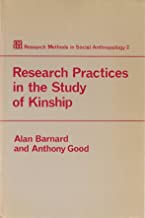
Alan Barnard & Anthony Good, Research Practices in the Study of Kinship (ASA Research Methods in Social Anthropology, 2). London & Orlando: Academic Press (1984; paperback 1988).
'The religious, economic and social organisation of a South Indian temple.' The Quarterly Journal of Social Affairs 3: 1-25 (1987).
'Divine coronation in a South Indian temple.' Pp 37-71 in V. Sudarsen, G. Prakash Reddy & M. Suryanarayana (eds.), Religion and Society in South India. B.P. Publ. Corp: Delhi (1987).
'Law, legitimacy, and the hereditary rights of Tamil temple priests', Modern Asian Studies 23: 233-257 (1989).
The Female Bridegroom: A Comparative Study of Life-Crisis Rituals in South India and Sri Lanka. Oxford: Clarendon Press (1991: OUP India edition published 1992).
'Social issues in NGO water projects.' Pp 47-66 in Ian Smout (ed.), Water and NGOs Loughborough University: Loughborough (1996)
'Seconder of motion on "Anthropology is a generalising science or it is nothing."' Pp 30-36 in Tim Ingold (ed.), Key Debates in Anthropology. Routledge: London (1996).
On the Non-Existence of Dravidian Kinship. (CSAS Occasional Papers, 6) Centre for South Asian Studies: Edinburgh (1996).
'Kinship.' Pp 311-318 in Alan Barnard & Jonathan Spencer (eds.), Encyclopedia of Social and Cultural Anthropology. Routledge: London (1996).
'The burning question: sacred and profane space in a South Indian temple town.' Anthropos 94: 69-84 (1999).
'The car and the palanquin: rival accounts of the 1895 riot in Kalugumalai, South India.' Modern Asian Studies 33: 23-66 (1999).
'Congealing divinity: time, worship and kinship in South Indian Hinduism.' Journal of the Royal Anthropological Institute (N.S.) 6: 273-292 (2000).
'Power and fertility: divine kinship in South India.' Pp 323-353 in Monika Böck & Aparna Rao (eds.), Culture, Creation, and Procreation: Concepts of Kinship in South Asian Practice. Berghahn Books: Oxford (2000).
'The structure and meaning of daily worship in a South Indian temple.' Anthropos 96: 491-507 (2001).
'Multiple meanings in South Indian temple worship.' Culture and Religion 2: 239-260 (2001).
'Mamul and modernity in a South Indian temple.' Modern Asian Studies 35: 821-870 (2001).
'Anthropologists as expert witnesses: political asylum cases involving Sri Lankan Tamils.' Pp. 93-117 in Richard Wilson & Jonathan Mitchell (eds.) Human Rights in Global Perspective. Routledge: London (2003).
'‘‘Undoubtedly an expert’’? Anthropologists in British asylum courts.' Journal of the Royal Anthropological Institute (N.S.) 10: 113-133 (2004).
‘Expert evidence in asylum and human rights appeals: an expert’s view.’ International Journal of Refugee Law 16: 358-380 (2004). (https://doi.org/10.1093/ijrl/16.3.358)
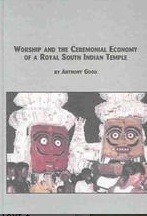
Worship and the Ceremonial Economy of a Royal South Indian Temple. Lampeter: Edwin Mellen Press (2004).
'Gender-based persecution: the case of South Asian asylum applicants in the UK.’ Pp 274-299 in Navnita Chandra Behera (ed), Gender, Conflict and Migration. Delhi: Sage (2006).
‘Writing as a kind of anthropology: alternative professional genres.’ Pp 91-115 in Geert De Neve & Maya Unnithan-Kumar (eds), Critical Journeys: the Making of Anthropologists. Aldershot: Ashgate (2006).

Anthropology and Expertise in the Asylum Courts. London: Routledge-Cavendish (2007).
‘Cultural evidence in courts of law.’ Journal of the Royal Anthropological Institute (N.S.) S47-S60 (2008). (https://doi.org/10.1111/j.1467-9655.2008.00492.x) [Reprinted at pp. 44-57 in Matthew Engelke (ed), The Objects of Evidence: Anthropological Approaches to the Production of Knowledge. Oxford: Wiley-Blackwell (2009).]
'Persecution for reasons of religion under the 1951 Refugee Convention.' Pp 27-48 in Thomas G. Kirsch & Bertram Turner (eds), Permutations of Order: Religion and Law as Contested Sovereignties. Farnham & Burlington VT: Ashgate (2009).
'Refugees.' Pp 596-597 in Alan Barnard & Jonathan Spencer (eds.), The Routledge Encyclopedia of Social and Cultural Anthropology (2nd edition). Routledge: London (2010).
'Witness statements and credibility assessments in the British asylum courts.' Pp 94-122 in Livia Holden (ed), Cultural Expertise and Litigation: Patterns, Conflicts, Narratives. London & New York: Routledge (2011).
'Tales of suffering: asylum narratives in the refugee status determination process.' West Coast Line 68: 80-89 (2011).
Robert Gibb & Anthony Good, 'Do the facts speak for themselves? Country of Origin Information in French and British refugee status determination procedures.' International Journal of Refugee Law 25(2): 291-322 (2013) (https://doi.org/10.193/ijrl/eet015).
Robert Gibb & Anthony Good, 'Interpretation, translation and intercultural communication in refugee status determination procedures in the UK and France.' Language and Intercultural Communication 14(3): 385-399 (2014) (https://doi.org/10.1080/14708477.2014.918314). [Reprinted in Alison Phipps & Rebecca Kay (eds), Languages in Migratory Settings: Place, Politics, and Aesthetics. London: Routledge (2015).]
'Anthropological evidence and Country of Origin Information in British asylum courts.' Pp. 122-144 in Benjamin N. Lawrance & Galya Ruffer (eds), Adjudicating Refugee and Asylum Status: The Role of Witness, Expertise and Testimony. New York: Cambridge University Press (2015).
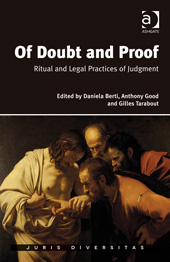
Daniela Berti, Anthony Good & Gilles Tarabout (eds.). Of Doubt and Proof: Ritual and Legal Practices of Judgment. Farnham: Ashgate (2015).
Anthony Good, Daniela Berti & Gilles Tarabout, 'Introduction: technologies of doubt in law and ritual.' Pp. 1-17 in Berti, Good & Tarabout (eds.), Of Doubt and Proof: Ritual and Legal Practices of Judgment. Farnham: Ashgate (2015).
'The benefit of the doubt in British asylum claims and international cricket.' Pp. 119-140 in Berti, Good & Tarabout (eds.), Of Doubt and Proof: Ritual and Legal Practices of Judgment. Farnham: Ashgate (2015).
'Foreword.' Pp. ix-xviii in Daniela Berti & Devika Bordia (eds), Regimes of Legality: Ethnography of Criminal Cases in South Asia. New Delhi: Oxford University Press (2015).
'Folk models and the law.' The Journal of Legal Pluralism and Unofficial Law 47(3): 423-437 (2015) (https://doi.org/10.1080/07329113.2015.1113645).
'Law and anthropology: legal pluralism and "lay" decision-making.' Pp. 211-238 in Dawn Watkins & Mandy Burton (eds), Research Methods in Law (2nd edition). London: Routledge (2017).
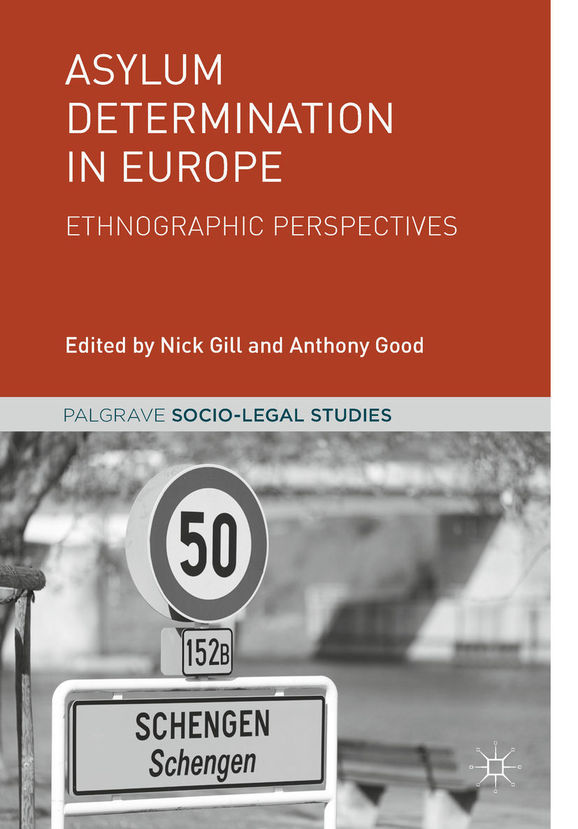
Nick Gill & Anthony Good (eds.), Asylum Determination in Europe: Ethnographic Perspectives. London: Palgrave Macmillan (2019). Free to download on Open Access at https://doi.org/10.1007/978-3-319-94749-5
Nick Gill & Anthony Good, 'Introduction.' Pp. 1-26 in Gill & Good (eds.), Asylum Determination in Europe: Ethnographic Perspectives. London: Palgrave Macmillan (2019).
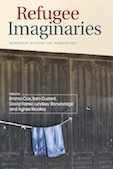
'Morality and law in the context of asylum claims.' Pp. 103-122 in Emma Cox, Sam Durrant, David Farrier, Lyndsey Stonebridge & Agnes Woolley (eds.), Refugee Imaginaries: Research Across the Humanities. Edinburgh: Edinburgh University Press (2020).
'Uses and misuses of Country of Origin Information (COI) in the refugee status determination process.' Cahiers de l'EDEM/Louvain Migration Case Law Commentary 2021 (June): 4-19 (2021). (https://uclouvain.be/fr/instituts-recherche/juri/cedie/actualites/uses-and-misuses-of-country-of-origin-information-coi-in-the-refugee-status-determination-process.html)
'Comment on Rose: "Forensic and expert social anthropology."' Open Anthropological Research 2: 76-79 (2022). Open Access. https://doi.org/10.1515/opan-2022-0119

Daniela Berti & Anthony Good (eds.), Animal Sacrifice,Religion and Law in South Asia. London & New York: Routledge (2024). Partially free to download on Open Access (see links below).
Daniela Berti & Anthony Good, 'Introduction: The judicialisation and politicisation of sacrifice.' Pp. 1-50 in Berti & Good (eds.) (2024) (q.v.). Free to download on Open Access at https://www.taylorfrancis.com/books/edit/10.4324/9781003284949/animal-s…
'Animal sacrifice, politics and the law in Tamil Nadu, South India.' Pp. 51-78 in Berti & Good (eds.) (2024) (q.v.). Free to download on Open Access at https://www.taylorfrancis.com/books/edit/10.4324/9781003284949/animal-sacrifice-religion-law-south-asia-daniela-berti-anthony-good?refId=4bed98c7-7620-4456-bcf4-6c60b7fc7e77&context=ubx
'Comment on Lawrence Rosen, "My culture made me do it." Free will and the expert witness's dilemma.' Current Anthropology 65(1): 158-159 (2024). https://doi.org/10.1086/728719
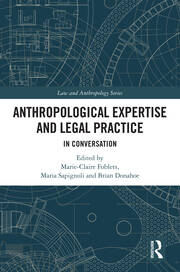
Anthony Paterson & Anthony Good, 'Collection and use of Country of Origin information in the United Kingdom’s refugee status determination process: the case of Sri Lanka.' Pp. 23-49 in Marie-Claire Foblets, Maria Sapignoli & Brian Donahoe (eds.), Anthropological Expertise and Legal Practice In Conversation. London & New York: Routledge (2024).
'Interpretation, translation and confusion in refugee status determination procedures.' International Journal for the Semiotics of Law https://doi.org/10.1007/s11196-025-10297-6 (2025) (Open Access).
'Law and anthropology: legal pluralism and "lay" decision-making' (expanded version). Pp. 201-229 in Dawn Watkins & Mandy Burton (eds), Research Methods in Law (3rd edition). London: Routledge (2025).
Working Papers and Work in Progress
(Please do not quote or cite without permission)
- 'Role confusion in the asylum courts: some instantaneous ethical dilemmas.' Unpublished 2010 seminar paper. Read it here.
- 'Anthropologists as providers of Country of Origin Information (COI) in the British asylum courts.' Unpublished 2012 conference paper. Read it here.
- 'Folk models and the law'. Unpublished 2013 plenary lecture. Read it here.
Best Practice Guide
My colleague Tobias Kelly and I, with advice from a group of experienced barristers and solicitors nominated by the Immigration Law Practitioners Association, have produced a guide for anthropologists and other 'country experts' who may be asked to write expert reports in connection with immigration and asylum appeals in the UK. Read and download it here.
(We welcome the reproduction of this publication for the purposes of legal representation, education and training, provided that no charge is made for use of the material and the source of the information is acknowledged.)
Works within
Staff Hours and Guidance
Since my retirement I no longer hold regular guidance and feedback hours, so please contact me by email if you want to arrange a meeting.